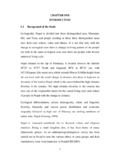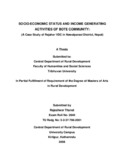Please use this identifier to cite or link to this item:
https://elibrary.tucl.edu.np/handle/123456789/794| Title: | Socio-Economic Status and Income Generating Activities of Bote Community: (A Case Study of Rajahar Vdc in Nawalparasi District, Nepal) |
| Authors: | Thanet, Rajeshwor |
| Keywords: | Socio-Economic;occupational structure;income |
| Issue Date: | 2008 |
| Publisher: | Department of English Education |
| Institute Name: | Central Department of Education |
| Level: | Masters |
| Abstract: | Economy of a community is often found to be greatly influenced by the physical structure of the area they have been inhabiting. Botes are no exception to it. Their economic life has been greatly shaped by their habitat. At present, most of them live beyond the subsistence level of economy and there are very for who comparatively enjoy better economic status, yet generally their economic status fails to come closer to other neighboring socio-cultural groups who are considered economically well. The present study entitled "Income Generating activities of Bote Community" was conducted in Rajahar Village Development Comittee, Nawalparasi, District, Nepal. The main objectives of this study were to find out income generating activities, socio-economic status, occupational structure of Bote community Botes are indigenous people of Nawalparasi. They especially live in the bank of Narayani river. Major source of income of Bote community is fishing and boating. Traditionally they are less dependent on farming. River is the main source of their livelihood. Most of them are unemployed and unskilled. Along with fishery, wage earning is another way of their income. Bote is the indigenous and alcohol drinking caste and they are mostly reside on the bank of river. There are two types of Bote, which are known as Pani Bote and Pakhe Bote. Pakhe Botes have been practicing agriculture for long time. Pani Botes also practice agriculture to some extent, but principally they depend on river for their subsistence. The Botes of study area do not practice Gold Panning because their forefather do not practice it. During leisure they weave fishing net and produce small artifacts of bamboo reeds for their personal use. Their past sources of livelihood have become less productive and insufficient, they do not fully depend on these sources and they have been compelled to look for alternative sources of livelihood. Botes are highly experienced food gatherers and possess vast knowledge of forest food products. They used to gathers forest food product from Chitwan National park. Botes of study area do not practice ferry service because there is no any opportunity to provide ferry service. Due to lack of enough land agriculture production alone cannot sustain them all the year round, food gap increase during Asar and Srawan. Moreover, their size of landholding is not enough to feed them even for a few months. During a economic hardship they look alternative mode of subsistence like wage labor. The Botes of Rajahar call themselves as Hindu. The Botes of Rajahar VDC celebrate almost all festivals of Hindu. During festivals they enjoy with their relatives and used to drink lot of alcohol. Male drink more alcohol than female. The general status of education of Bote in the study area was found to very much below the national average. Most of Botes are illiterate which is unlikely to other community. They do not send their kids to the school because they cannot pay fee and they have lack of awareness. Most of the Bote people of the study area consult traditional healer for treatment. Poverty has played great role to the deteriorating condition of their health. Lack of capability to find new and modern type of job is serious problem to Bote people to sustain their livelihood. So the defects on law and regulation of government should be amended to make their life easier |
| URI: | http://elibrary.tucl.edu.np/handle/123456789/794 |
| Appears in Collections: | Rural Development |
Files in This Item:
| File | Description | Size | Format | |
|---|---|---|---|---|
| CHAPTER(1).pdf | 247.47 kB | Adobe PDF |  View/Open | |
| cover.pdf | 29.74 kB | Adobe PDF |  View/Open |
Items in DSpace are protected by copyright, with all rights reserved, unless otherwise indicated.
